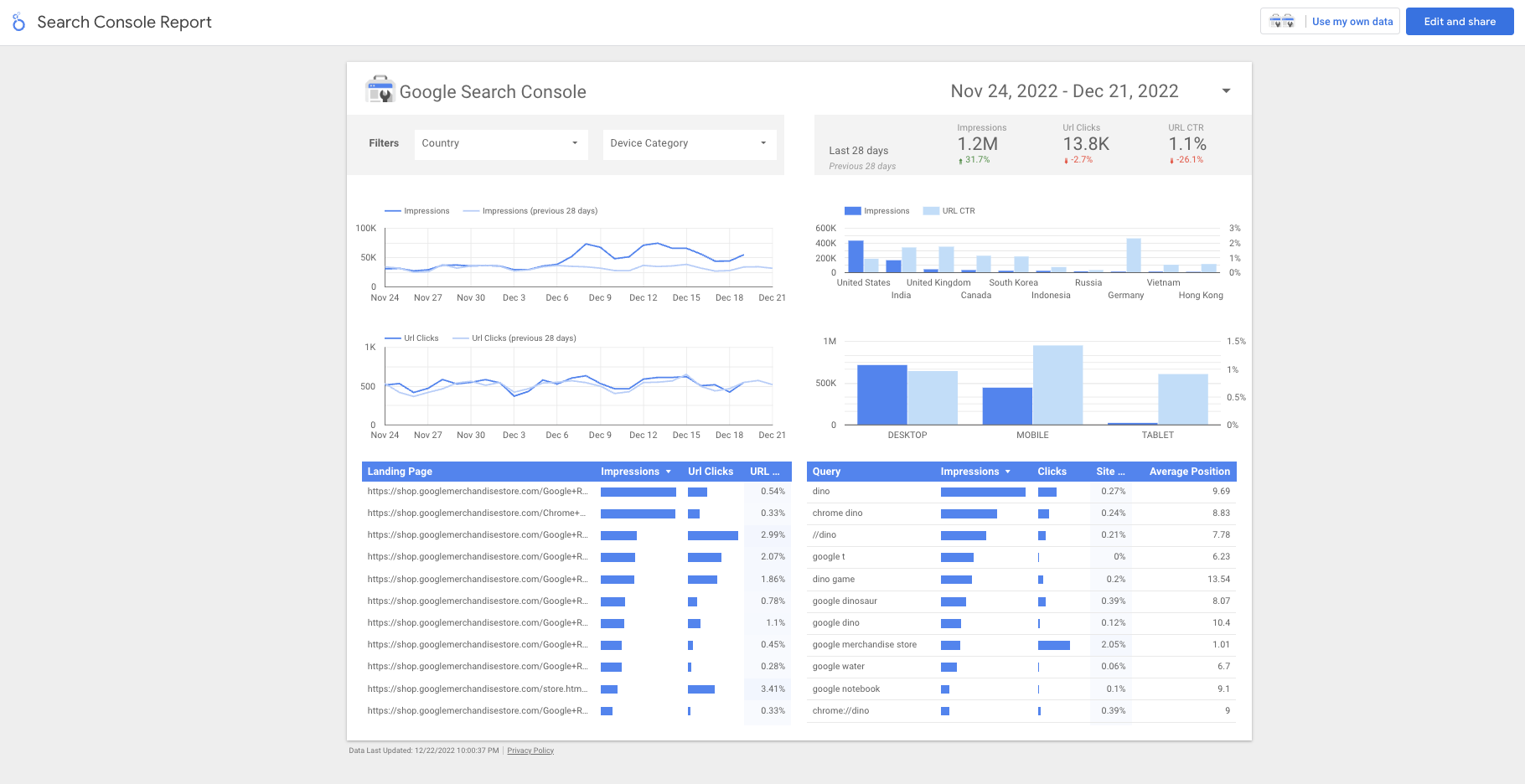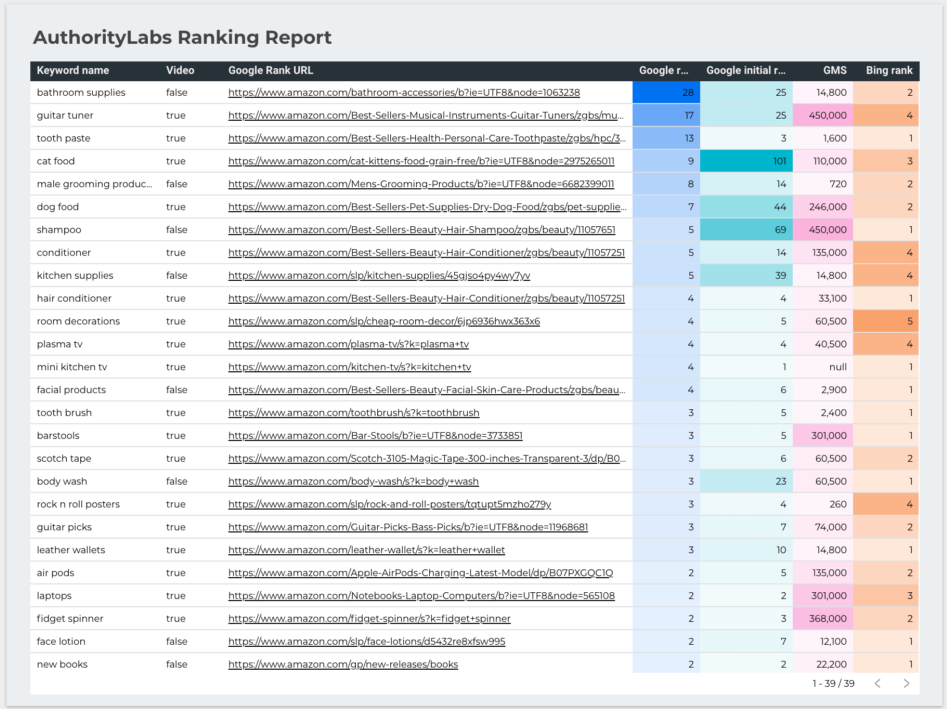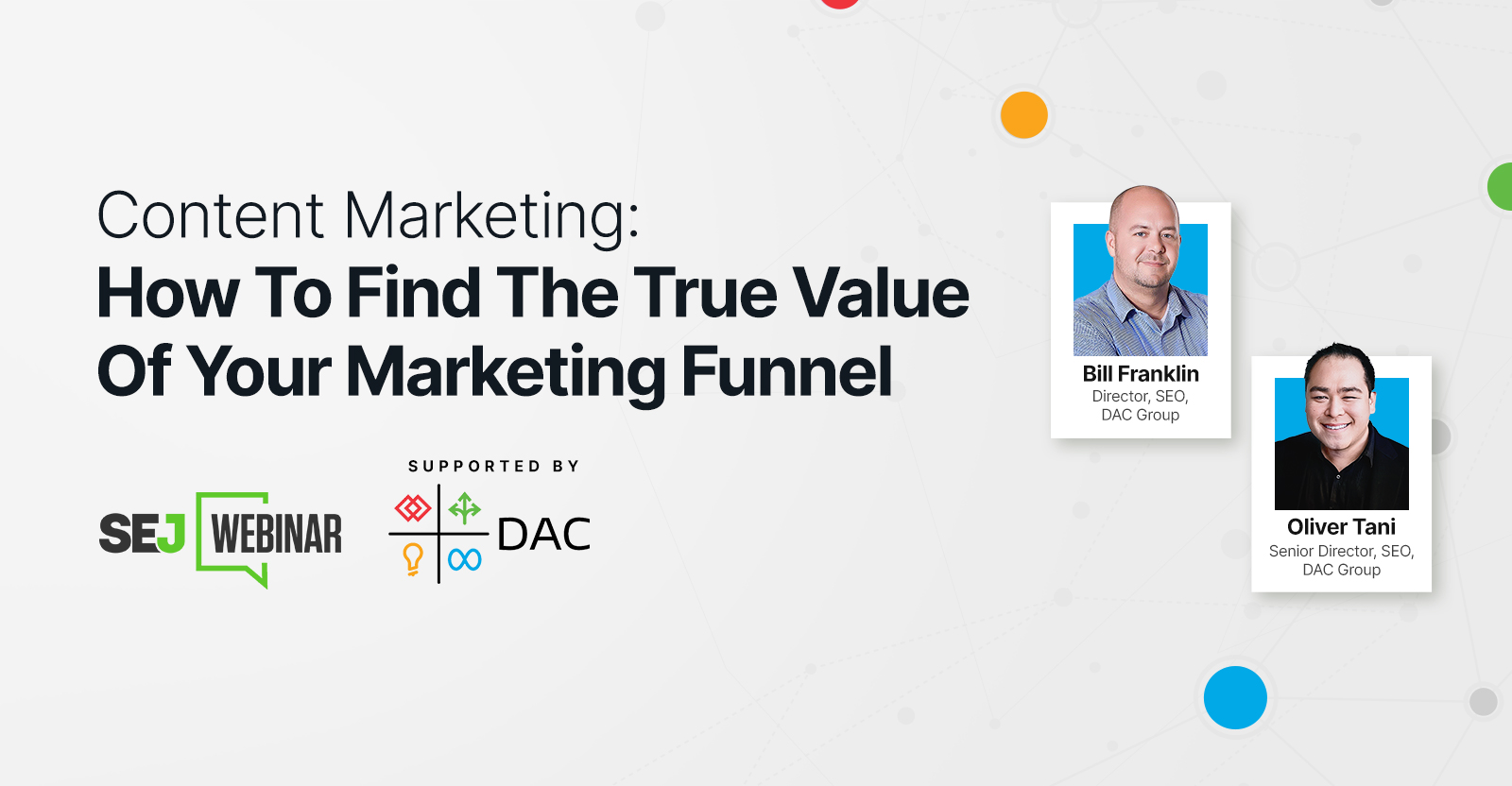SEO
Top 5 Essential SEO Reporting Tools For Agencies

Your clients trust you to create real results and hit KPIs that drive their businesses forward.
Understanding the intricacies of how that works can be difficult, so it’s essential to demonstrate your progress and efforts.
SEO reporting software showcases important metrics in a digestible and visually represented way. They save guesswork and manual referencing, highlighting achievements over a specified time.
A great tool can also help you formulate action items, gauge the performance of campaigns, and see real results that can help you create new and innovative evaluations.
The latest and allegedly greatest tools hit the market all the time, promising to transform how you conduct reports.
Certainly, you have to weigh a few factors when deciding which software to implement. Price, features, and ease of use are the most important to consider.
A cost-effective tool with a steep learning curve might not be worth it for the features. Similarly, an expensive tool might be more appealing if it is user-friendly but could quickly run up costs.
Just like any transformational business decision, you’ll have to weigh the pros and cons carefully to determine the right one for you.
Key Takeaways
- Cost, accessibility, and features are the common thread of comparison for SEO reporting tools.
- To truly get the best use out of an SEO reporting tool for your agency, you’ll need to weigh several details, including scalability, customization, integrations, and access to support.
- What might be considered a subpar tool could be a game-changer for an agency. Due diligence and research are the keys to knowing what will work for your team.
What To Look For In SEO Reporting Tools
It can be tough to make heads or tails of the available tools and choose which will benefit your agency the most.
Here are the 10 essential requirements of SEO reporting tools.
1. Accurate And Current Regional Data
SEO reporting is all about data. The software must have access to accurate and current data localized to your client’s targeted region.
Search data from the U.S. is meaningless if your client tries to rank for [London plumbing services], so localization matters.
The tool must update data regularly and with reliable accuracy so you can make informed decisions about where your client stands against the competition.
2. Integration With Third-Party Tools
Especially for full-scale digital marketing campaigns, the ability to report on all KPIs in one place is essential.
The more available integrations with third-party tools (e.g., Google Analytics, Google Business Profile, Majestic), the better.
Some tools even allow you to upload custom data sets.
3. Scalability
You don’t want to have to retrain or reinvest in new software every time your agency reaches a new tier.
The right SEO reporting tool should work well for your current business size and leave room for expansion as you onboard more clients.
4. Strong Suite Of Features
A great SEO reporting tool should include:
- Position tracking.
- Backlink monitoring.
- Competitor data.
- Analytics.
It is a bonus if the tool has reporting features for social media, email marketing, call tracking, and/or paid ads to make it a full-suite digital marketing software.
5. Continually Improving And Updating Features
SEO is constantly evolving, and so should SEO reporting tools.
As we continue the transition from website optimization to web presence optimization, a tool’s ability to integrate new features is essential.
6. Ability To Customize Reports
Each client will have different KPIs, objectives, and priorities.
Presenting the information that clients want to see is paramount to successful campaigns and retention.
Your reporting software of choice should be able to emphasize the correct data at the right times.
7. Client Integration
A good SEO reporting tool must have the client in mind.
It should have a simple bird’s eye overview of the basics but also be easy for clients to dig into the data at a deeper level.
This can mean automated summary reports or 24/7 client access to the dashboard.
8. Ability To White Label Reports
While white labeling is not essential (no client will sniff at receiving a report with a Google logo in the top corner), it helps keep branding consistent and gives a professional sheen to everything you send a client’s way.
9. Access To Support Resources
Quality support resources can help you find a detour when you encounter a roadblock.
Whether it’s detailed support documentation, a chat feature/support desk, or responsive customer support on social media, finding the help you need to solve the issue is important.
10. Cost-To-Value Ratio
With a proper process, time investment, and leveraging support resources, it is possible to get better results from a free reporting tool than one that breaks the bank.
This can mean automated summary reports or 24/7 client access to the dashboard.
Top 5 SEO Reporting Tools
In evaluating five of the most popular SEO reporting tools, based on the above criteria, here is how they stack up:
1. AgencyAnalytics
My Overall Rating: 4.7/5
AgencyAnalytics is a quality introductory/intermediate reporting tool for agencies.
Among the tools on this list, it is one of the easiest to use for small to mid-sized agencies.
It starts at $12 per month, per client, with unlimited staff and client logins, a white-label dashboard, and automated branded reports. The minimum purchase requirements mean the first two tiers work out to $60 per month and $180 per month, respectively. But your ability to change the payment based on the number of clients could help keep costs lean.
AgencyAnalytics comes with 70+ supported third-party data integrations.
However, this reliance on third-party data means you may have incomplete reports when there is an interruption in the transmission.
Though new integrations are always being added, they can be glitchy at first, making them unreliable to share with clients until stabilized.
With the ability for clients to log in and view daily data updates, it provides real-time transparency.
Automated reports can be customized, and the drag-and-drop customized dashboard makes it easy to emphasize priority KPIs.
2. SE Ranking
My Overall Rating: 4.5/5
SE Ranking has plans starting at $39.20 per month, although the $87.20 per month plan is necessary if you need historical data or more than 10 projects.
Setup is a breeze, as the on-screen tutorial guides you through the process.
SE Ranking features a strong collection of SEO-related tools, including current and historical position tracking, competitor SEO research, keyword suggestion, a backlink explorer, and more.
SE Ranking is hooked up with Zapier, which allows users to integrate thousands of apps and provide a high level of automation between apps like Klipfolio, Salesforce, HubSpot, and Google Apps.
SE Ranking is an effective SEO reporting tool at a beginner to intermediate level.
However, you may want to look in a different direction if your agency requires more technical implementations or advanced customization.
3. Semrush
My Overall Rating: 4.4/5
Semrush is one of the most SEO-focused reporting tools on the list, which is reflected in its features.
Starting at $229.95 per month for the agency package, it’s one of the more expensive tools on the list. But Semrush provides a full suite of tools that can be learned at an intermediate level.
A major downside of Semrush, especially for cost-conscious agencies, is that an account comes with only one user login.
Having to purchase individual licenses for each SEO analyst or account manager adds up quickly, and the users you can add are limited by the plan features. This makes scalability an issue.
Semrush has both branded and white-label reports, depending on your subscription level. It uses a proprietary data stream, tracking more than 800 million keywords.
The ever-expanding “projects” feature covers everything from position tracking to backlink monitoring and social media analysis.
Though it doesn’t fall specifically under the scope of SEO reporting, Semrush’s innovation makes it a one-stop shop for many agencies.
Project features include Ad Builder, which helps craft compelling ad text for Google Ads, and Social Media Poster, which allows agencies to schedule client social posts.
Combining such diverse features under the Semrush umbrella offsets its relatively high cost, especially if you can cancel other redundant software.
4. Looker Studio
My Overall Rating: 3.6/5
 Screenshot from Looker Studio, December 2022
Screenshot from Looker Studio, December 2022Formerly known as Google Data Studio, Looker Studio is a Google service that has grown considerably since its initial launch.
Though it is much more technical and requires more time investment to set up than most other tools on this list, it should be intuitive for staff familiar with Google Analytics.
If you’re on the fence, Looker Studio is completely free.
A major upside to this software is superior integration with other Google properties like Analytics, Search Console, Ads, and YouTube.
Like other reporting tools, it also allows third-party data integration, but the ability to query data from databases, including MySQL, PostgreSQL, and Google’s Cloud SQL, sets it apart.
You can customize reports with important KPIs with proper setup, pulling from lead and customer information. For eCommerce clients, you can even integrate sales data.
Though the initial setup will be much more technical, the ability to import templates saves time and effort.
You can also create your own templates that better reflect your processes and can be shared across clients. Google also has introductory video walk-throughs to help you get started.
5. Authority Labs
My Overall Rating: 3.2/5
 Image credit: Authority Labs, December 2022
Image credit: Authority Labs, December 2022Authority Labs does the job if you’re looking for a straightforward position-tracking tool.
Authority Labs is $49 per month for unlimited users, though you will need to upgrade to the $99 per month plan for white-label reporting.
You can track regional ranking data, get insights into “(not provided)” keywords, track competitor keywords, and schedule automated reporting.
However, lacking other essential features like backlink monitoring or analytic data means you will have to supplement this tool to provide a full SEO reporting picture for clients.
Conclusion
There are many quality SEO reporting tools on the market. What makes them valuable depends on their ability to work for your clients’ needs.
SE Ranking has a fantastic cost-to-value ratio, while Looker Studio has advanced reporting capabilities if you can withstand a higher barrier to entry.
Agency Analytics prioritizes client access, which is a big deal if transparency is a core value for your agency.
Authority Labs keeps it lean and clean, while Semrush always adds innovative features.
These five are simply a snapshot of what is available. There are new and emerging tools that might have some features more appealing to your current clients or fill gaps that other software creates despite being a great solution.
Ultimately, you need to consider what matters most to your agency. Is it:
- Feature depth?
- Scalability?
- Cost-to-value ratio?
Once you weigh the factors that matter most for your agency, you can find the right SEO reporting tool. In the meantime, don’t shy away from testing out a few for a trial period.
If you don’t want to sign up for a full month’s usage, you can also explore walkthrough videos and reviews from current users. The most informed decision requires an understanding of the intricate details.
Featured Image: Paulo Bobita/Search Engine Journal
SEO
Measuring Content Impact Across The Customer Journey

Understanding the impact of your content at every touchpoint of the customer journey is essential – but that’s easier said than done. From attracting potential leads to nurturing them into loyal customers, there are many touchpoints to look into.
So how do you identify and take advantage of these opportunities for growth?
Watch this on-demand webinar and learn a comprehensive approach for measuring the value of your content initiatives, so you can optimize resource allocation for maximum impact.
You’ll learn:
- Fresh methods for measuring your content’s impact.
- Fascinating insights using first-touch attribution, and how it differs from the usual last-touch perspective.
- Ways to persuade decision-makers to invest in more content by showcasing its value convincingly.
With Bill Franklin and Oliver Tani of DAC Group, we unravel the nuances of attribution modeling, emphasizing the significance of layering first-touch and last-touch attribution within your measurement strategy.
Check out these insights to help you craft compelling content tailored to each stage, using an approach rooted in first-hand experience to ensure your content resonates.
Whether you’re a seasoned marketer or new to content measurement, this webinar promises valuable insights and actionable tactics to elevate your SEO game and optimize your content initiatives for success.
View the slides below or check out the full webinar for all the details.
SEO
How to Find and Use Competitor Keywords

Competitor keywords are the keywords your rivals rank for in Google’s search results. They may rank organically or pay for Google Ads to rank in the paid results.
Knowing your competitors’ keywords is the easiest form of keyword research. If your competitors rank for or target particular keywords, it might be worth it for you to target them, too.
There is no way to see your competitors’ keywords without a tool like Ahrefs, which has a database of keywords and the sites that rank for them. As far as we know, Ahrefs has the biggest database of these keywords.
How to find all the keywords your competitor ranks for
- Go to Ahrefs’ Site Explorer
- Enter your competitor’s domain
- Go to the Organic keywords report
The report is sorted by traffic to show you the keywords sending your competitor the most visits. For example, Mailchimp gets most of its organic traffic from the keyword “mailchimp.”


Since you’re unlikely to rank for your competitor’s brand, you might want to exclude branded keywords from the report. You can do this by adding a Keyword > Doesn’t contain filter. In this example, we’ll filter out keywords containing “mailchimp” or any potential misspellings:


If you’re a new brand competing with one that’s established, you might also want to look for popular low-difficulty keywords. You can do this by setting the Volume filter to a minimum of 500 and the KD filter to a maximum of 10.


How to find keywords your competitor ranks for, but you don’t
- Go to Competitive Analysis
- Enter your domain in the This target doesn’t rank for section
- Enter your competitor’s domain in the But these competitors do section


Hit “Show keyword opportunities,” and you’ll see all the keywords your competitor ranks for, but you don’t.


You can also add a Volume and KD filter to find popular, low-difficulty keywords in this report.


How to find keywords multiple competitors rank for, but you don’t
- Go to Competitive Analysis
- Enter your domain in the This target doesn’t rank for section
- Enter the domains of multiple competitors in the But these competitors do section


You’ll see all the keywords that at least one of these competitors ranks for, but you don’t.


You can also narrow the list down to keywords that all competitors rank for. Click on the Competitors’ positions filter and choose All 3 competitors:


- Go to Ahrefs’ Site Explorer
- Enter your competitor’s domain
- Go to the Paid keywords report


This report shows you the keywords your competitors are targeting via Google Ads.
Since your competitor is paying for traffic from these keywords, it may indicate that they’re profitable for them—and could be for you, too.
You know what keywords your competitors are ranking for or bidding on. But what do you do with them? There are basically three options.
1. Create pages to target these keywords
You can only rank for keywords if you have content about them. So, the most straightforward thing you can do for competitors’ keywords you want to rank for is to create pages to target them.
However, before you do this, it’s worth clustering your competitor’s keywords by Parent Topic. This will group keywords that mean the same or similar things so you can target them all with one page.
Here’s how to do that:
- Export your competitor’s keywords, either from the Organic Keywords or Content Gap report
- Paste them into Keywords Explorer
- Click the “Clusters by Parent Topic” tab


For example, MailChimp ranks for keywords like “what is digital marketing” and “digital marketing definition.” These and many others get clustered under the Parent Topic of “digital marketing” because people searching for them are all looking for the same thing: a definition of digital marketing. You only need to create one page to potentially rank for all these keywords.


2. Optimize existing content by filling subtopics
You don’t always need to create new content to rank for competitors’ keywords. Sometimes, you can optimize the content you already have to rank for them.
How do you know which keywords you can do this for? Try this:
- Export your competitor’s keywords
- Paste them into Keywords Explorer
- Click the “Clusters by Parent Topic” tab
- Look for Parent Topics you already have content about
For example, if we analyze our competitor, we can see that seven keywords they rank for fall under the Parent Topic of “press release template.”


If we search our site, we see that we already have a page about this topic.


If we click the caret and check the keywords in the cluster, we see keywords like “press release example” and “press release format.”


To rank for the keywords in the cluster, we can probably optimize the page we already have by adding sections about the subtopics of “press release examples” and “press release format.”
3. Target these keywords with Google Ads
Paid keywords are the simplest—look through the report and see if there are any relevant keywords you might want to target, too.
For example, Mailchimp is bidding for the keyword “how to create a newsletter.”


If you’re ConvertKit, you may also want to target this keyword since it’s relevant.
If you decide to target the same keyword via Google Ads, you can hover over the magnifying glass to see the ads your competitor is using.


You can also see the landing page your competitor directs ad traffic to under the URL column.


Learn more
Check out more tutorials on how to do competitor keyword analysis:
SEO
Google Confirms Links Are Not That Important

Google’s Gary Illyes confirmed at a recent search marketing conference that Google needs very few links, adding to the growing body of evidence that publishers need to focus on other factors. Gary tweeted confirmation that he indeed say those words.
Background Of Links For Ranking
Links were discovered in the late 1990’s to be a good signal for search engines to use for validating how authoritative a website is and then Google discovered soon after that anchor text could be used to provide semantic signals about what a webpage was about.
One of the most important research papers was Authoritative Sources in a Hyperlinked Environment by Jon M. Kleinberg, published around 1998 (link to research paper at the end of the article). The main discovery of this research paper is that there is too many web pages and there was no objective way to filter search results for quality in order to rank web pages for a subjective idea of relevance.
The author of the research paper discovered that links could be used as an objective filter for authoritativeness.
Kleinberg wrote:
“To provide effective search methods under these conditions, one needs a way to filter, from among a huge collection of relevant pages, a small set of the most “authoritative” or ‘definitive’ ones.”
This is the most influential research paper on links because it kick-started more research on ways to use links beyond as an authority metric but as a subjective metric for relevance.
Objective is something factual. Subjective is something that’s closer to an opinion. The founders of Google discovered how to use the subjective opinions of the Internet as a relevance metric for what to rank in the search results.
What Larry Page and Sergey Brin discovered and shared in their research paper (The Anatomy of a Large-Scale Hypertextual Web Search Engine – link at end of this article) was that it was possible to harness the power of anchor text to determine the subjective opinion of relevance from actual humans. It was essentially crowdsourcing the opinions of millions of website expressed through the link structure between each webpage.
What Did Gary Illyes Say About Links In 2024?
At a recent search conference in Bulgaria, Google’s Gary Illyes made a comment about how Google doesn’t really need that many links and how Google has made links less important.
Patrick Stox tweeted about what he heard at the search conference:
” ‘We need very few links to rank pages… Over the years we’ve made links less important.’ @methode #serpconf2024″
Google’s Gary Illyes tweeted a confirmation of that statement:
“I shouldn’t have said that… I definitely shouldn’t have said that”
Why Links Matter Less
The initial state of anchor text when Google first used links for ranking purposes was absolutely non-spammy, which is why it was so useful. Hyperlinks were primarily used as a way to send traffic from one website to another website.
But by 2004 or 2005 Google was using statistical analysis to detect manipulated links, then around 2004 “powered-by” links in website footers stopped passing anchor text value, and by 2006 links close to the words “advertising” stopped passing link value, links from directories stopped passing ranking value and by 2012 Google deployed a massive link algorithm called Penguin that destroyed the rankings of likely millions of websites, many of which were using guest posting.
The link signal eventually became so bad that Google decided in 2019 to selectively use nofollow links for ranking purposes. Google’s Gary Illyes confirmed that the change to nofollow was made because of the link signal.
Google Explicitly Confirms That Links Matter Less
In 2023 Google’s Gary Illyes shared at a PubCon Austin that links were not even in the top 3 of ranking factors. Then in March 2024, coinciding with the March 2024 Core Algorithm Update, Google updated their spam policies documentation to downplay the importance of links for ranking purposes.
The documentation previously said:
“Google uses links as an important factor in determining the relevancy of web pages.”
The update to the documentation that mentioned links was updated to remove the word important.
Links are not just listed as just another factor:
“Google uses links as a factor in determining the relevancy of web pages.”
At the beginning of April Google’s John Mueller advised that there are more useful SEO activities to engage on than links.
Mueller explained:
“There are more important things for websites nowadays, and over-focusing on links will often result in you wasting your time doing things that don’t make your website better overall”
Finally, Gary Illyes explicitly said that Google needs very few links to rank webpages and confirmed it.
I shouldn’t have said that… I definitely shouldn’t have said that
— Gary 鯨理/경리 Illyes (so official, trust me) (@methode) April 19, 2024
Why Google Doesn’t Need Links
The reason why Google doesn’t need many links is likely because of the extent of AI and natural language undertanding that Google uses in their algorithms. Google must be highly confident in its algorithm to be able to explicitly say that they don’t need it.
Way back when Google implemented the nofollow into the algorithm there were many link builders who sold comment spam links who continued to lie that comment spam still worked. As someone who started link building at the very beginning of modern SEO (I was the moderator of the link building forum at the #1 SEO forum of that time), I can say with confidence that links have stopped playing much of a role in rankings beginning several years ago, which is why I stopped about five or six years ago.
Read the research papers
Authoritative Sources in a Hyperlinked Environment – Jon M. Kleinberg (PDF)
The Anatomy of a Large-Scale Hypertextual Web Search Engine
Featured Image by Shutterstock/RYO Alexandre
-

 PPC4 days ago
PPC4 days ago19 Best SEO Tools in 2024 (For Every Use Case)
-
SEARCHENGINES7 days ago
Daily Search Forum Recap: April 16, 2024
-

 SEO7 days ago
SEO7 days agoGoogle Clarifies Vacation Rental Structured Data
-

 MARKETING6 days ago
MARKETING6 days agoStreamlining Processes for Increased Efficiency and Results
-
SEARCHENGINES6 days ago
Daily Search Forum Recap: April 17, 2024
-

 SEO6 days ago
SEO6 days agoAn In-Depth Guide And Best Practices For Mobile SEO
-

 PPC6 days ago
PPC6 days ago97 Marvelous May Content Ideas for Blog Posts, Videos, & More
-

 MARKETING5 days ago
MARKETING5 days agoEcommerce evolution: Blurring the lines between B2B and B2C














You must be logged in to post a comment Login